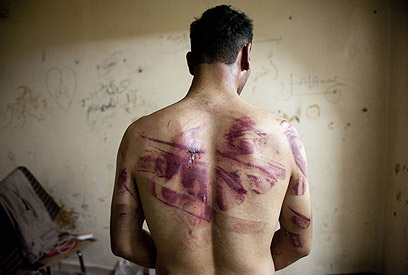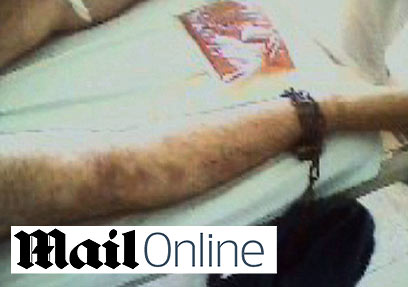
Report: Torture evidence found in Syrian prisons
Rights activists discover torture devices in deserted Assad prisons; find cross-shaped tool used to bend prisoner's arms, legs; 'They used electricity shocks on me for hours,' says former detainee
Raqqa, in eastern Syria, was overrun in late February by rebels fighting to topple President Bashar Assad. The rebels facilitated the New York-based group's access to facilities that had belonged to a government security agency and military intelligence in late April.
Related stories:
- Report: Russia sends warships to Syrian coast
- UN: Number of Syrian refugees tops 1.5 million
- Russia says still committed to Syria arms deal
The HRW said its researchers found physical evidence that Syrians were tortured, including with a device which former detainees said was used to stretch or bend victims' arms and legs. The group also found documents indicating Raqqa residents were detained for legal actions like demonstrating or helping the injured.

A Syrian showing marks of torture in Aleppo. Archives (Photo: AFP)
Rights groups and opposition activists have long claimed that civilians have been detained arbitrarily, tortured, and sometimes have disappeared since the uprising against Assad's regime began. HRW's findings appear to be one of the largest finds of physical evidence bolstering those claims to date.
"The documents, prison cells, interrogation rooms, and torture devices we saw in the government's security facilities are consistent with the torture former detainees have described to us," said Nadim Houry, deputy Middle East director for HRW.
In one method of torture the HRW report details, the victim is tied to a flat board, sometimes in the shape of a cross. In some cases guards stretched or pulled their limbs or folded the board in half so that their face touched their legs, causing pain.
HRW has been documenting abuses on both sides of Syria's civil war during the 26 months of conflict.
The group says abuses by the Assad regime remain far more deadly, systematic and widespread, including attacks on civilians with indiscriminate battlefield weapons such as widely banned cluster bombs. But the rights group also says rebel abuses have increased in frequency and scale in recent months.
In Raqqa, the group's researchers inspected the State Security and Military Intelligence branches and three other detention centers formerly managed by Criminal Security, Political Security, and Air Force Intelligence. Government forces abandoned all these institutions, which are now controlled by the rebels, the group said.
Four former detainees said that officers and guards tortured them, HRW said.
One of them, identified in the report as Ahmed, a 24-year-old student from Raqqa, told HRW that he and
his brother had been detained April 7, 2012 in the city's Military Intelligence branch on charges of participating in peaceful demonstrations. The group said it gave only first names of former detainees in the report for fear their testimonies could subject them or their families to further government harassment.
Ahmed said he and his brother had been beaten and tortured with electricity shocks for several hours a day throughout five days of detention. He told HRW that intelligence officers and prison guards wanted him to give up the names of other protesters.
"The torture started in turns between my brother and me," Ahmed said. "They started torturing him with electricity for three, four hours, and then they threw him in a solitary cell. They wanted me to tell them who used to go out to demonstrate with me. And they would make me hear my brother's screams."
The interrogators also threatened to detain his mother. Ahmed told HRW that the possibility of his mother being harmed made him confess to anything.
"Whatever it is you want, I am with you," he said he had told the interrogators. "I will fingerprint a white piece of paper, and you write what you want."
Ahmed was ultimately tried in a military court in the northern city of Aleppo. He was released from a civilian prison in Raqqa June 8, 2012, following a court decision to sentence him to time served, the report said.
He joined the rebels after his release and has been with a Raqqa-based opposition group known as the Islamic Front for Unity and Liberation, HRW said.
A history of violence
The first evidence of abuse in the Syrian civil war were released in March 2012 by the British Channel 4, which showed a video of patients in a state hospital, chained to their beds and bearing bruises and marks of torture.
A hospital employee described the abuse some patients undergo: "They turn their leg until it breaks, give electricity shocks, whippings and tie the penis so they will not be able to pee."

Patient chained to a hospital bed

A patient tortured in a hospital, according to Channel 4
It was also reported of knocking patients' heads against the wall and surgery without anesthesia.
Last week, concerns of abuse in Syria resurfaced after shocking footage of a rebel leader was revealed.
In the video, a man known as Abu Sakkar is seen cutting into a Syrian soldier's body, taking out an internal organ and biting into it while boasting that he is eating the soldier's heart.
The man later justified his actions by citing the soldier's own immoral acts, including abusing women.
A surgeon who viewed the footage told the American magazine Time that the organ appears to be the soldier's lung, and not his heart.
The footage gained Abu Sakkar international notoriety, and on Friday he discussed the affair, saying that he is willing to stand trial for his actions, but only if President Bashar Assad does the same.
"I am ready to be held accountable for my actions, on condition that Bashar and his shabbiha (militias) are tried for crimes they committed against our women and children," he said.
"I send this message to the world: if the bloodshed in Syria does not stop, every Syrian will become Abu Sakkar."
Asked why he mutilated the soldier's body, Abu Sakkar said the man's phone contained video clips of him raping women, burning bodies and cutting off the limbs of captives.
In another memorable incident from the civil war, Assad's men were captured on footage while burying alive a rebel, taunting him to praise Assad and covering him with dirt until he is not seen anymore, ignoring his pleas.
Since the start of the Syrian civil war in March 2011 at least 80,000 were killed, and more than a millions and a half became refugees.
- Receive Ynetnews updates directly to your desktop











